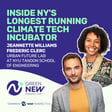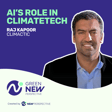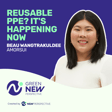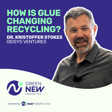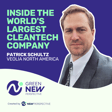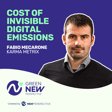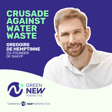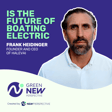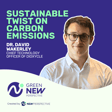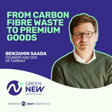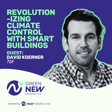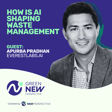
Waste to Wonder: The Future of Water Recycling
Hey there, welcome back to The Green New Perspective! AquiPor's new material — permeable concrete — does what traditional surfaces can’t. It absorbs water like a sponge but filters out the accompanying pollutants. It’s got a low carbon footprint, unlike traditional cement, and provides a sustainable means to dealing with our need to collect and contain water.
Traditional drainage and water collection systems — or gray infrastructure — just can’t address the impacts of our changing climate, where heavier storms inundate our cities but we have no way of effectively saving the water to stave off drought.
Greg and Kevin’s surface technology is still in the proof-of-concept stage, but it’s generating a ton of buzz in the industry. With its focus on sustainability and innovation, AquiPor is definitely a company to watch — and we think it’s got a game-changing solution.
🕑 💡 KEY MOMENTS
==================
➜ 01:19 Introduction
➜ 5:54 Problems that AquiPor solves
➜ 8:23 Other steps to modernize water infrastructure in America
➜ 12:00 Educating yourself on water problems
➜ 14:38 Role that technology can play in addressing the issue
➜ 16:22 How AquiPot helps modernize a water infrastructure
➜ 18:03 Biggest challenges
➜ 19:24 Optimism toward the future of water
➜ 20:55 Advice for future generations
➜ 23:47 How can we get involved
➜ 26:22 Message for the end
📚 RESOURCES & LINKS
========================
- Web: https://www.aquipor.com
- Water Voice Podcast: https://www.aquipor.com/podcasts/
- FB: https://www.facebook.com/AquiPor/
- IG: https://www.instagram.com/aquiportech/
- TW: https://www.twitter.com/aquiportech
🌍 SUSTAINABILITY PODCAST CREATED BY NEW PERSPECTIVE
========================
This podcast is proudly sponsored by New Perspective Marketing, a dynamic growth marketing agency in Boston, MA, celebrating 20 years in business. We help sustainably focused B2B organizations grow their brands and scale up revenue. If you or your organization is looking to grow, visit npws.com for more info.
🎧 SUBSCRIBE TO OUR PODCAST
===========================
- Spotify: https://bit.ly/3PSWIyI
- Apple Podcasts: https://bit.ly/3RvlHte
- Youtube: https://bit.ly/3RDzkXg
- Google Podcasts: http://bit.ly/465gjS5
- Deezer: https://bit.ly/3PvQaof
- Amazon Music: https://bit.ly/3PQlijS
- Zencastr: https://bit.ly/48xt75s
💬 FOLLOW US ON SOCIAL MEDIA
============================
- Instagram: https://www.instagram.com/greennewperspective/
- Twitter: https://twitter.com/gnperspective
- Facebook: https://www.facebook.com/greennewperspective
- LinkedIn: https://www.linkedin.com/showcase/greennewperspective/
- TikTok: https://www.tiktok.com/@greennewperspective
- Threads: https://www.threads.net/@greennewperspective
#sustainabilitypodcast #cleanenergy #greennewperspective #sustainability #cleanenergy #podcast #cleantech

